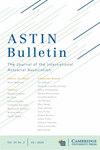具有空间嵌入的地理利率制定
IF 1.8
3区 经济学
Q2 ECONOMICS
引用次数: 3
摘要
空间数据是精算应用的丰富信息来源:了解风险的位置可以改善保险公司的费率制定、保留或风险管理流程。依赖历史地理位置的损失数据在有限或不可用的地区是有问题的。在本文中,我们使用外部人口普查数据在复杂的卷积神经网络表示模型中构建空间嵌入,并将其用作简单预测模型的输入。与空间插值模型相比,我们的方法在大多数情况下导致更小的预测偏差和更小的方差。这种方法还使我们能够在没有历史经验的地区产生利率。本文章由计算机程序翻译,如有差异,请以英文原文为准。
GEOGRAPHIC RATEMAKING WITH SPATIAL EMBEDDINGS
Abstract Spatial data are a rich source of information for actuarial applications: knowledge of a risk’s location could improve an insurance company’s ratemaking, reserving or risk management processes. Relying on historical geolocated loss data is problematic for areas where it is limited or unavailable. In this paper, we construct spatial embeddings within a complex convolutional neural network representation model using external census data and use them as inputs to a simple predictive model. Compared to spatial interpolation models, our approach leads to smaller predictive bias and reduced variance in most situations. This method also enables us to generate rates in territories with no historical experience.
求助全文
通过发布文献求助,成功后即可免费获取论文全文。
去求助
来源期刊

ASTIN Bulletin
数学-数学跨学科应用
CiteScore
3.20
自引率
5.30%
发文量
24
审稿时长
>12 weeks
期刊介绍:
ASTIN Bulletin publishes papers that are relevant to any branch of actuarial science and insurance mathematics. Its papers are quantitative and scientific in nature, and draw on theory and methods developed in any branch of the mathematical sciences including actuarial mathematics, statistics, probability, financial mathematics and econometrics.
 求助内容:
求助内容: 应助结果提醒方式:
应助结果提醒方式:


